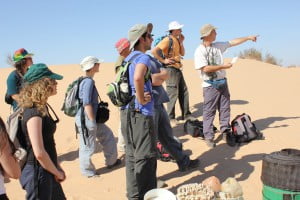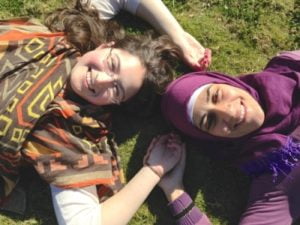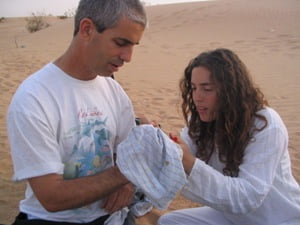About the Arava Institute

The Arava Institute for Environmental Studies is one of the leading environmental academic and research institutions in the Middle East. Its mission is to use the world’s environmental resource challenges to build dialogue, cooperation, and trust among people and, in doing so, create a catalyst for peace.
Located on Kibbutz Ketura in southern Israel, the Arava Institute is dedicated to training the next generation of environmental leaders—Israelis, Palestinians, Jordanians, and students from around the world. By studying cutting-edge approaches to water resource management, ecology, sustainable agriculture, and renewable energy, students at the Arava Institute learn to collaborate around their shared environmental concerns.
The Arava Institute offers students an exceptional opportunity to learn from leading professionals while forming friendships and developing skills that enable them to lead the region and world in solving today’s most pressing environmental challenges. These relationships build the trust and last far beyond students’ time at the Institute. Today, the Arava Institute has over 1,400 alumni, the majority of whom live in the Middle East and continue to work in the environmental field and social justice fields.
Academic Programs

At the Arava Institute, students can study for one or two semesters. Students take between 4-5 courses in natural and social environmental sciences in the areas of water management, renewable energy, sustainable agriculture, environmental ethics, and more. Students can also choose to pursue an independent project for the duration of the semester. All courses are taught in English.
Each semester, the Arava Institute brings concepts from the classroom to life in a real-world context through field trips to different regions in the Middle East. On these educational field trips, students meet with experts on regional environmental issues and conflict resolution, hear from local stakeholders, and visit historic sites and museums.
The Arava Institute’s program brings together between 40-50 students from Israel, Palestine, Jordan, the United States, and around the world. No other program allows students from such varied political, cultural, and religious backgrounds to live, study, and learn about one another for a semester or more. Together, students also take part in the Peace-building Leadership Seminar, where they explore issues of culture, religion, identity, and the current political situation.
The Institute typically brings together a student body comprised of approximately 1/3 Arabs, 1/3 Jewish Israelis and 1/3 North Americans. This representation of young people is critical to the overall success of the peace-building approach since one of the main objectives is to encourage environmental cooperation across different communities in the region. Involving North Americans in the program reflects the influence of the United States in the Israeli-Arab conflict and widens participants’ perspectives on environmental issues as well as enabling a deeper understanding of the conflict and exploring models for mitigating the conflict.
Peace-Building Leadership Seminar

Central to the Arava Institute’s program is its Peace-building Leadership Seminar (PLS) to develop students’ leadership skills and provide them with a facilitated forum for expressing their views on race, religion, culture, identity, and the current political situation. Over the course of the program, PLS’s students develop:
- Cultural understanding, respect, empathy and self-reflection
- A sense of empowerment, agency and initiative
- A sense of shared community, even during times of conflict
- Skills for effective and open dialogue, campaigning, and advocacy
- Informed perspectives on the politics of the Middle East and the environment
- A general understanding of coexistence initiatives and environmental campaigns
Beyond the PLS curriculum, the Institute provides students with an exceptional opportunity to learn about their classmates’ cultural backgrounds in a sensitive way that prepares them to be better communicators and leaders in the years to come. Students attend class, study, and eat together – as many as eight students live together in one dorm unit. The necessity of navigating challenges posed by cultural and religious differences in the dining room, the classroom, and the dorms are lessons in themselves. These experiences build cross-cultural understanding, confidence, and an important set of leadership skills that students apply to future academic and professional settings.
Research Studies

The Arava Institute is also home to five environmental research and development centers. Each center has its own trans-boundary environmental mission and applied-technology programs. Center researchers serve as the Arava Institute’s core faculty in the academic program.
- Jordan-Israel Center for Community, Environment and Research (JICCER) supports the well-being of the natural and human systems of the Arava Valley through cross-border community initiatives and research. The center aims to “reopen the bridges” between the southern Jordanian and Israeli communities through research, capacity building and policy engagement for regional, environmental and sustainable development. JICCER’s activities include cross-border projects in the fields of ecotourism, environmental education, women’s cooperatives and empowerment, agriculture and land-use management, and community-based environmental systems and technologies.
- The Center for Trans-boundary Water Management (CTWM), provides a platform for regional water professionals and policy makers to cooperate in water conservation, desalination, wastewater treatment, and public education activities.
- The Center for Sustainable Agriculture (CSA), is dedicated to the investigation and preservation of arid lands and their natural resources. Working collaboratively with arid land research institutes in Israel and around the world, the Center is a vital player in the field of desert agriculture and sustainable agriculture.
- The Center for Renewable Energy and Energy Conservation (CREEC), leads the renewable energy research and development initiatives in the southern Arava region. Leveraging the natural desert environment and some of the highest solar radiation levels in the world, CREEC established the Arava Institute Research and Visitors Park to oversee innovative research, commercial solar validation, and biogas projects.
- The Center for Hyper-Aird Socio-Ecology (CHASE), focuses on the natural ecosystem in the Arava valley and the interaction between those ecosystems and the local people.
The Friends of the Arava Institute is a US registered 501(c)(3) not-for-profit organization. Its mission is to support the critical environmental and peace-building work of the Arava Institute for Environmental Studies through fundraising campaigns, student recruitment, alumni relations, and public education events. Donations to the Arava Institute through the Friends of the Arava Institute are tax deductible.
As a partner to the Israel Ride, the Friends of the Arava Institute functions as the charity of record and processes all donations for the Israel Ride, ensuring appropriate and accurate rider and donor support and recognition. The Friends of the Arava Institute is also the lead partner on supporting rider fundraising efforts, overseeing marketing and communications calendars, and engaging the Israel Ride alumni community.
The Friends of the Arava Institute is supported by a national board of 48 trustees, many of whom were first introduced to the Arava Institute through their Israel Ride experience. A professional staff team, headquartered in Boston, is dedicated to manifesting the values of the Arava Institute in the United States and around the world. Today, the Friends of the Arava Institute is the largest funder to the Arava Institute in Israel, raising over 2/3 of its annual budget.